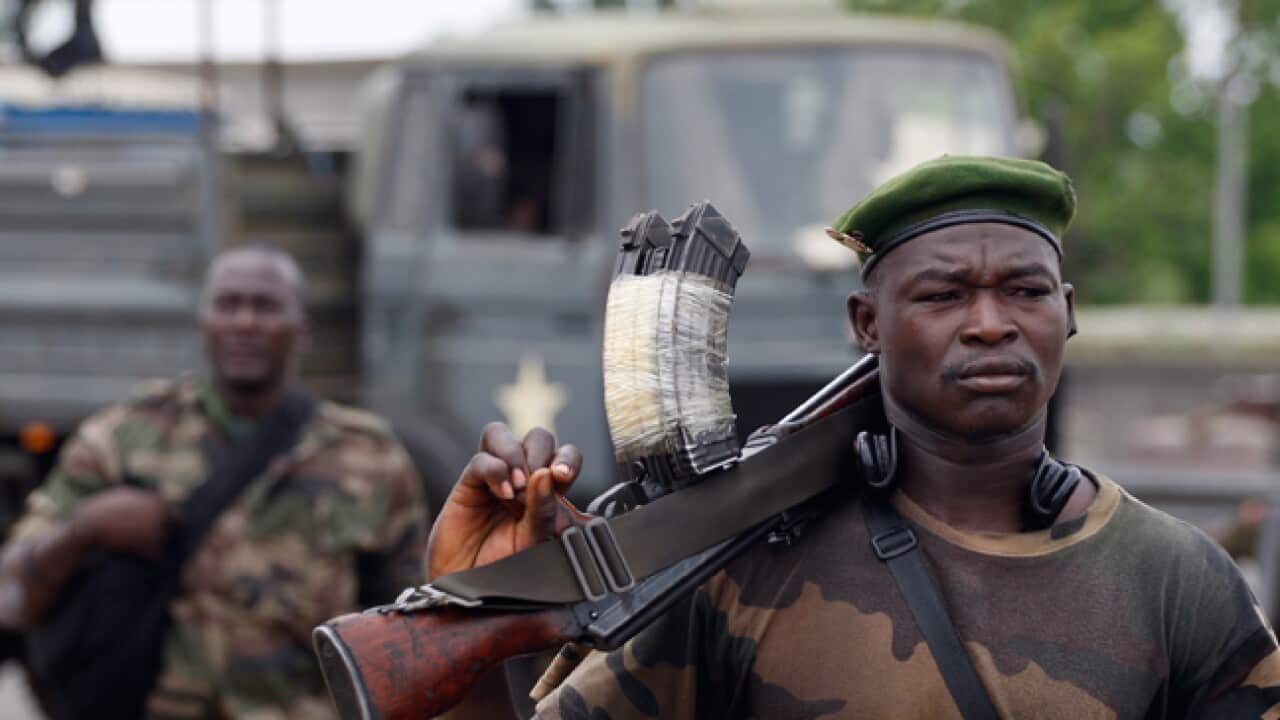US Secretary of State Hillary Clinton joined UN chief Ban Ki-moon in denouncing "the unacceptable attacks on UN peacekeepers" in Ivory Coast, the State Department said.
In talks held in Washington, Clinton and Ban also "reviewed international efforts to support the people of Cote d'Ivoire and to compel Laurent Gbagbo to step aside immediately," State Department spokesman Mark Toner said in a statement.
"They also highlighted the need for the international community to respond generously to the increasing humanitarian needs there."
The officials met in Washington as Ivory Coast strongman Gbagbo was still in contact with international representatives about a possible surrender.
A French government source said earlier that negotiations with Gbagbo over him giving up had failed. Forces loyal to internationally recognized president Alassane Ouattara have launched an offensive on Gbagbo's residence.
Ouattara's forces seal off Gbagbo's bunker
Ivory Coast's internationally recognised president Alassane Ouattara has ordered a blockade around his rival Laurent Gbagbo's residence where he remained holed up, as more gunfire shook Abidjan.
Bodies lay in the streets of the country's main city days into a military offensive to force Gbagbo to give up the presidency, with food stocks running low, water and power supplies erratic and security plummeting, witnesses said.
Residents reported explosions and firing as they hid in their homes in the Cocody suburb where the strongman was still hunkered down in a bunker in the presidential residence after Ouattara's forces failed to remove him.
Ouattara went on television yesterday night announcing the blockade and calling on his troops to restore order in Abidjan, where roaming militia have been engaged in looting and random attacks in recent days.
"A blockade has been set up around (the) perimeter" of Gbagbo's residence to make the district safe for local residents, said Ouattara, claiming Gbagbo had "heavy weapons and mercenaries" at hand.
Addressing Ivorians for the first time since the country's post-election crisis came to a head, Ouattara appealed for national reconciliation and a resumption of economic activity in the world's leading cocoa producer.
"The curfew will be relaxed as from Friday April 8 to enable a progressive return to normality," he declared.
UN Secretary General Ban Ki-moon urged Gbagbo to quit power before it was "too late".
"It is absolutely necessary at this time that, before too late, he has to cede his power to the democratically elected leader, Mr Ouattara," Ban said, adding: "It is his last opportunity to gracefully exit from this."
At the same time, the UN envoy to the west African country said Gbagbo would be taken alive and put on trial.
"Sooner or later he will be captured and brought to justice," Ambassador Youssoufou Bamba told a press conference, while insisting that Ouattara wants his rival taken alive even though his forces have carried out one offensive against the Gbagbo bunker.
"Too much blood has been shed. We would not give the luxury to Mr Gbagbo to be a martyr. He will be captured alive and will respond before justice for the crimes he has committed," the envoy said.
On Wednesday Ouattara fighters tried to storm the residence but had to pull back after heavy fighting in which the home of the Japanese ambassador was surrounded as Gbagbo's fighters used it to launch rockets and cannon fire.
Ambassador Yoshifumi Okamura and several aides hid in a saferoom until French forces staged a dramatic helicopter rescue, extracting the group at about 11:00 pm and moving them to a French military camp, officials said.
"There was no major fighting, and no injuries among the French soldiers involved," French military spokesman Colonel Thierry Burkhard said.
Israel had also asked French forces to extract its diplomats from the conflict-torn city, French Foreign Minister Alain Juppe said in Paris.
About 1,100 foreigners have been flown out of the commercial capital since Sunday, while 1,548 foreign citizens were being sheltered at the military base, a French force spokesman said.
"Today, at the moment, former president Gbagbo's forces are reportedly fewer than 1,000, including 200 at his residence," French Defence Minister Gerard Longuet said.
Ouattara's camp earlier said they were going to storm the bunker and forcibly remove Gbagbo to end his decade-long rule of the world's number one cocoa producer after losing November elections.
In France a government source said Ouattara forces had launched a final assault after negotiations to persuade Gbagbo to give up power failed.
Gbagbo's camp condemned the move as an "assassination attempt".
After calling for a ceasefire and retreating to the bunker with his wife Simone and a few others, Gbagbo insisted in a radio interview late Tuesday he would not accept he had lost the vote and he was prepared to die.
Gbagbo was elected in 2000 and postponed polls due in 2005 several times before allowing them to go ahead last year, only to reject the result issued by the election authority and backed by the United Nations.
Several hundred people have been killed in violence linked to the presidential standoff, with reports of massacres of hundreds in the west last week, while up to a million had fled their homes, according to UN figures.
Ouattara also promised in his televised address that "light will be shed on all the massacres and the crimes" which might have been committed.
"The authors of the crimes will be punished," he said, calling on his troops "to be exemplary in their behaviour and to abstain from any crime, any violence against the population or any act of pillage."
The humanitarian situation in Abidjan was "absolutely dramatic," the UN Office for the Coordination of Humanitarian Affairs said, with hospitals and public services not working and bodies lying in the streets.
"There are armed rebel groups who don't know on which side they are -- who are looting not only private houses but also some stocks of humanitarian agencies, that's unacceptable," spokeswoman Elisabeth Byrs said in Geneva.
Share

